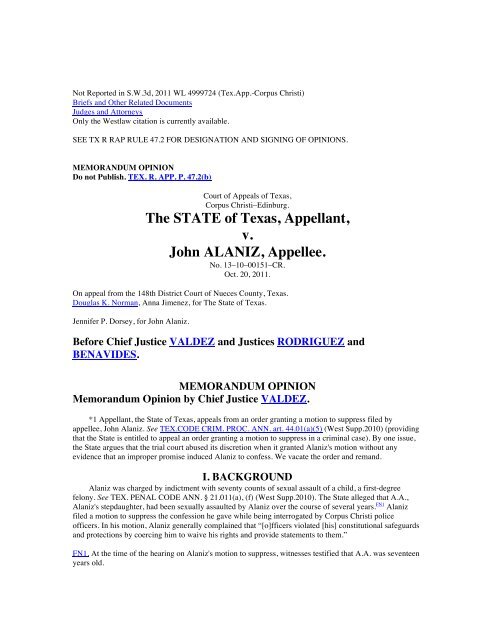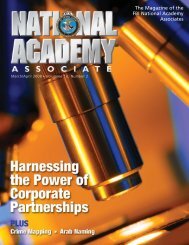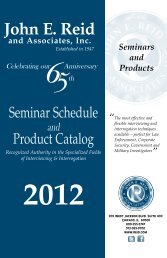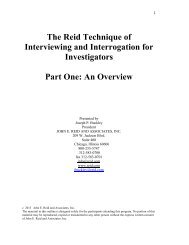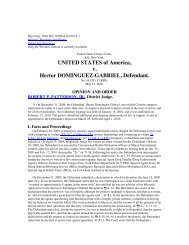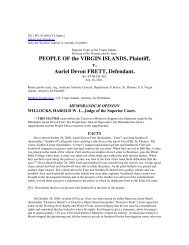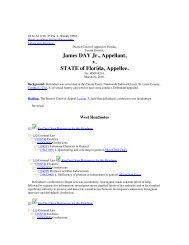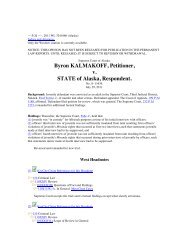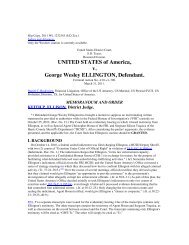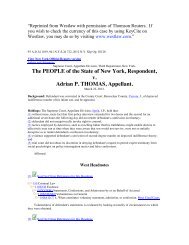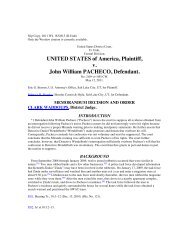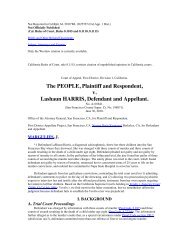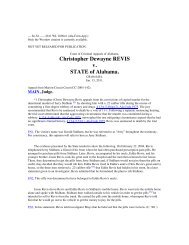The STATE of Texas Appellant v John ALANIZ Appellee
Alaniz case - promise to keep from media - The Reid Technique of ...
Alaniz case - promise to keep from media - The Reid Technique of ...
- No tags were found...
Create successful ePaper yourself
Turn your PDF publications into a flip-book with our unique Google optimized e-Paper software.
Not Reported in S.W.3d, 2011 WL 4999724 (Tex.App.-Corpus Christi)<br />
Briefs and Other Related Documents<br />
Judges and Attorneys<br />
Only the Westlaw citation is currently available.<br />
SEE TX R RAP RULE 47.2 FOR DESIGNATION AND SIGNING OF OPINIONS.<br />
MEMORANDUM OPINION<br />
Do not Publish. TEX. R. APP. P. 47.2(b)<br />
Court <strong>of</strong> Appeals <strong>of</strong> <strong>Texas</strong>,<br />
Corpus Christi–Edinburg.<br />
<strong>The</strong> <strong>STATE</strong> <strong>of</strong> <strong>Texas</strong>, <strong>Appellant</strong>,<br />
v.<br />
<strong>John</strong> <strong>ALANIZ</strong>, <strong>Appellee</strong>.<br />
No. 13–10–00151–CR.<br />
Oct. 20, 2011.<br />
On appeal from the 148th District Court <strong>of</strong> Nueces County, <strong>Texas</strong>.<br />
Douglas K. Norman, Anna Jimenez, for <strong>The</strong> State <strong>of</strong> <strong>Texas</strong>.<br />
Jennifer P. Dorsey, for <strong>John</strong> Alaniz.<br />
Before Chief Justice VALDEZ and Justices RODRIGUEZ and<br />
BENAVIDES.<br />
MEMORANDUM OPINION<br />
Memorandum Opinion by Chief Justice VALDEZ.<br />
*1 <strong>Appellant</strong>, the State <strong>of</strong> <strong>Texas</strong>, appeals from an order granting a motion to suppress filed by<br />
appellee, <strong>John</strong> Alaniz. See TEX.CODE CRIM. PROC. ANN. art. 44.01(a)(5) (West Supp.2010) (providing<br />
that the State is entitled to appeal an order granting a motion to suppress in a criminal case). By one issue,<br />
the State argues that the trial court abused its discretion when it granted Alaniz's motion without any<br />
evidence that an improper promise induced Alaniz to confess. We vacate the order and remand.<br />
I. BACKGROUND<br />
Alaniz was charged by indictment with seventy counts <strong>of</strong> sexual assault <strong>of</strong> a child, a first-degree<br />
felony. See TEX. PENAL CODE ANN. § 21.011(a), (f) (West Supp.2010). <strong>The</strong> State alleged that A.A.,<br />
Alaniz's stepdaughter, had been sexually assaulted by Alaniz over the course <strong>of</strong> several years. FN1 Alaniz<br />
filed a motion to suppress the confession he gave while being interrogated by Corpus Christi police<br />
<strong>of</strong>ficers. In his motion, Alaniz generally complained that “[o]fficers violated [his] constitutional safeguards<br />
and protections by coercing him to waive his rights and provide statements to them.”<br />
FN1. At the time <strong>of</strong> the hearing on Alaniz's motion to suppress, witnesses testified that A.A. was seventeen<br />
years old.
At the hearing on his motion to suppress, Alaniz testified that after he “had a lot <strong>of</strong> conversations with<br />
[O.G., his common-law wife and A.A.'s mother]” and had informed her <strong>of</strong> “everything that was<br />
happening,” O.G. told him to talk with Detective James Lerma. FN2 Alaniz went to the Corpus Christi Police<br />
Station on three different occasions to confess to the crimes alleged in the indictment. Alaniz testified that<br />
on the first two occasions he was asked to come back, and on the third occasion he had the following<br />
conversation with Detective Lerma:<br />
FN2. At the hearing on the motion to suppress, O.G. testified that she contacted the police after A.A. told<br />
her about the alleged incidents. According to O.G., she spoke with Detective Lerma before Alaniz was<br />
interviewed and told him she was concerned “that if anybody mentioned [A.A.'s relationship to Alaniz],<br />
many people would know who this victim was.” O.G. explained that, in response to her concerns about the<br />
media, “Detective Lerma mentioned that it would be easier if [Alaniz] came in and confessed, than them<br />
having to put out a warrant and go and-if he was wanted, basically, they would have to go look for him.”<br />
O.G. testified that she then told Alaniz “that the police had mentioned about it being easier for him just to<br />
go in than them having to go look for him.” O.G. continued, “I pictured that his face would be all over the<br />
T.V. and the newspaper if they had to go searching for him. He did not want to come in.” Detective Lerma<br />
denied ever speaking to O.G. about media coverage surrounding this incident.<br />
San Juana Adame, Alaniz's mother, also testified that Alaniz called her and told her that he wanted to<br />
turn himself in to avoid being arrested, having media coverage, and embarrassing the family.<br />
I said, “I was told that I—if I come in and confess, that you guys wouldn't put me on the news, and I don't<br />
want to embarrass my family any[ ]more,” and [Detective Lerma] said, “Yes.” And I said, Are you sure?”<br />
And he said, “I guarantee it.”<br />
Subsequently, Detective Lerma interviewed Alaniz. <strong>The</strong> trial court admitted a DVD <strong>of</strong> that recorded<br />
interview for the limited purpose <strong>of</strong> the suppression hearing. Our review <strong>of</strong> the recording reveals that early<br />
in the interview, Alaniz informed Detective Lerma <strong>of</strong> the following: “I was told that once this happened<br />
that it's just not going to come out. It's not going to be broadcast. That they'll be O.K. Right?”, to which<br />
Lerma responded, “<strong>The</strong>y should be O.K. Yes, sir.” Later in the interview, Alaniz explained that he and his<br />
son talked about what had happened, that Alaniz had stupid thoughts in his head, and that his wife told him<br />
that if he did those things that everything would come out. Alaniz further stated that “[w]e were told that if<br />
I came in and confessed, and I did, you'd try to keep it ... quiet for everybody. I've done a lot to them. <strong>The</strong>y<br />
don't deserve ... all those things. <strong>The</strong>y don't deserve to go through this.” Lerma said, “O.K.”, to Alaniz's<br />
comment. Near the end <strong>of</strong> the interview, when asked if there were any other victims, Alaniz said, “You<br />
thinking <strong>of</strong> dragging my sons into this?”, to which Detective Lerma responded, “Absolutely not. Absolutely<br />
not. You've done the right thing by coming over here and telling us exactly what happened. <strong>The</strong> only thing<br />
is if you fail to tell us something, we have to go look for it and that's when we get anybody else involved.”<br />
*2 At the suppression hearing, after viewing Alaniz's videotaped interview, the State asked Detective<br />
Lerma, “Okay. Let's talk about inducement or promises. Do you have any understanding as to what<br />
[Alaniz] meant by that on the tape?” Detective Lerma answered as follows:<br />
[Alaniz] did ask me about the media and stuff like that. I told him that I wasn't in a position to grant him<br />
anything like that. I think that would be settled between his counsel and [Alaniz]. <strong>The</strong> police department<br />
nor myself were [sic] in any position to make those type <strong>of</strong> promises, but he did mention them to me.<br />
Later, on cross-examination, when defense counsel asked Detective Lerma about media coverage, the<br />
following exchange occurred:<br />
Q. And not only did you get background information, but you also talked about potential media coverage<br />
[before the videotaped interview], correct?<br />
A. He asked me about it, yes, sir.<br />
Q. And you were aware that media coverage was important to him, correct?
A. He asked about it. I'm assuming it was.<br />
Q. Okay. So he made it clear to you that it was important to him about not having any media coverage <strong>of</strong> this<br />
event, correct?<br />
A. Yes.<br />
Q. And are you telling this Court under oath that you made-in that out-<strong>of</strong>-court interview that you made no<br />
promises to him about media coverage?<br />
A. Yes, I'm telling you that, sir.<br />
.....<br />
Q. Okay. And [it's] fair to say from watching [the taped interview], he had an impression that you told him it<br />
would not be broadcast?<br />
A. His concern was with the victim and that he wanted to make sure that she was okay, which I told him she<br />
was and that her name-there was not going to be media coverage involving the victim because victims <strong>of</strong><br />
sexual assault and rape victims we do not usually issue their names to the media.<br />
Q. And he made it clear to you that keeping the victim's name out <strong>of</strong> the media was very important to him,<br />
correct?<br />
A. I believe so, yes, sir.<br />
Q. And you made the promise to him that you would keep the victim's name out <strong>of</strong> the media?<br />
A. Our department's policy is to leave the victim's name out <strong>of</strong> the media for the most part, yes, sir. Even in<br />
our report we list them as “rape victims.”<br />
Q. Okay. But you made the promise to him to keep the victim's name out <strong>of</strong>—<br />
.....<br />
A. <strong>The</strong> victim, under my understanding, was going to be taken care <strong>of</strong> and that her name was not going to be<br />
in the media.<br />
Q. What was your response to his request that the victim stay out <strong>of</strong> the media, sir?<br />
.....<br />
THE COURT: ... [T]hat the police department would keep the victim's name and identity and image out <strong>of</strong><br />
the media?<br />
[DEFENSE]: That's the question.<br />
A. Yes.<br />
Q. And so it was promised to him that the police department would keep the victim's name out <strong>of</strong> the media?<br />
A. We try to [do] our very best to keep the victim's name out <strong>of</strong> the media, yes, sir.<br />
THE COURT: He articulated the department's policy, which is?<br />
*3 A. To list sexual victims as “rape victims.”
Q. And did you—in this recorded interview did you ever tell him that's their policy?<br />
A. In the recorded video, no, sir.<br />
Q. Okay. But you told him about the policy, the department policy before the recorded interview, correct?<br />
A. His concern was for the victim, and I told him, yes, we were going to do our very best to keep her out <strong>of</strong><br />
the media.<br />
Q. Okay. And you can see how that would be taken as a promise or guarantee by him?<br />
.....<br />
A. No, sir.<br />
During closing arguments, counsel for Alaniz argued that Detective Lerma made two promises that<br />
induced Alaniz to confess: (1) that “[w]e were going to do our very best to keep her out <strong>of</strong> the media”; and<br />
(2) that there would be no media coverage <strong>of</strong> the events. In response, the State characterized Detective<br />
Lerma's statement to Alaniz regarding efforts to keep A.A.'s name out <strong>of</strong> the media as merely an expression<br />
<strong>of</strong> police policy and argued that “[s]tating mere policy that the police department always tries to keep the<br />
victim's name out is certainly not a promise”; “there was not any promise <strong>of</strong> anything.” <strong>The</strong> State also<br />
argued that even if Detective Lerma's statement was construed as a promise, it was not such that it would<br />
cause Alaniz to speak untruthfully.<br />
After considering the evidence and arguments <strong>of</strong> counsel presented at the hearing, the trial court<br />
concluded, in open court, that there was insufficient evidence to find that Detective Lerma promised that<br />
either the detective or the police department would block media coverage <strong>of</strong> the event. <strong>The</strong> trial court<br />
reasoned, however, that although Detective Lerma articulated department policy in a general way, when he<br />
testified, “I told him, yes, we were going to do our very best to keep her out <strong>of</strong> the media,” his words<br />
focused on Alaniz's specific concerns about the victim. <strong>The</strong> trial court continued, “I think ... [this statement]<br />
goes beyond the articulation, the expression, the explanation <strong>of</strong> department policy. I find that it was a<br />
promise on the part <strong>of</strong> the detective, that the promise taints the confession <strong>of</strong> [Alaniz].”<br />
After orally granting the motion at the hearing, the trial court signed an order granting Alaniz's motion<br />
to suppress his oral confession and any evidence <strong>of</strong> such a confession. This appeal followed.<br />
II. STANDARD OF REVIEW<br />
As an appellate court, we review a trial court's decision to admit or exclude evidence under an abuse<br />
<strong>of</strong> discretion. See Green v. State, 934 S.W.2d 92, 101–02 (Tex.Crim.App.1996); Montgomery v. State, 810<br />
S.W.2d 372, 379–80 (Tex.Crim.App.1990) (en banc). We will reverse the judgment only if it is outside the<br />
zone <strong>of</strong> reasonable disagreement. State v. Dixon, 206 S.W.3d 587, 590 (Tex.Crim.App.2006); Montgomery,<br />
810 S.W.2d at 391.<br />
In reviewing a trial court's ruling on a motion to suppress evidence, we use a bifurcated standard. State<br />
v. Ross, 32 S.W.3d 853, 856 (Tex.Crim.App.2000) (en banc) (citing Guzman v. State, 955 S.W.2d 85, 88<br />
(Tex.Crim.App.1997) (en banc)); see also Urbina v. State, No. 13–08–00562–CR, 2010 Tex.App. LEXIS<br />
6728, *3–7 (Tex.App.-Corpus Christi Aug. 19, 2010, pet. ref'd) (mem. op., not designated for publication).<br />
We give almost total deference to the trial court's findings <strong>of</strong> historical fact that are supported by the record<br />
and to mixed questions <strong>of</strong> law and fact that turn on an evaluation <strong>of</strong> credibility and demeanor. Amador v.<br />
State, 221 S.W.3d 666, 673 (Tex.Crim.App.2007) (citing Guzman, 995 S.W.2d at 89). We “review de novo<br />
‘mixed questions <strong>of</strong> law and fact’ that do not depend upon credibility and demeanor.” Id. (quoting<br />
Montanez v. State, 195 S.W.3d 101, 107 (Tex.Crim.App.2006)); see Guzman, 995 S.W.2d at 89.
*4 “In reviewing a trial court's ruling on a motion to suppress, an appellate court must view the<br />
evidence in the light most favorable to the trial court's ruling.” State v. Kelly, 204 S.W.3d 808, 818<br />
(Tex.Crim.App.2006). When the trial court has not made a finding on a relevant fact, we imply the finding<br />
that supports the trial court's ruling, so long as it finds some support in the record. Id.<br />
III. APPLICABLE LAW<br />
“A statement <strong>of</strong> an accused may be used in evidence against him if it appears that the same was freely<br />
and voluntarily made without compulsion or persuasion....” TEX.CODE CRIM. PROC. ANN. art. 38.21<br />
(West 2005). “To decide this case the court <strong>of</strong> appeals must examine the totality <strong>of</strong> the circumstances<br />
surrounding the acquisition <strong>of</strong> the statement to determine whether it was given voluntarily.” Creager v.<br />
State, 952 S.W.2d 852, 856–57 (Tex.Crim.App.1997) (en banc).<br />
“[F]or a promise to render a confession invalid under [a]rticle 38.21, the promise must be positive,<br />
made or sanctioned by someone in authority, and <strong>of</strong> such an influential nature that it would cause a<br />
defendant to speak untruthfully.” Martinez v. State, 127 S.W .3d 792, 794 (Tex.Crim.App.2004); see<br />
Sossamon v. State, 816 S.W.2d 340, 345 (Tex.Crim.App.1991) (en banc), abrogated on other grounds by<br />
Graham v. State, 994 S.W.2d 651, 656 (Tex.Crim.App.1999) (explaining that “an appellate court must look<br />
to whether the circumstances <strong>of</strong> the promises made the defendant ‘inclined to admit a crime he had not<br />
committed’ ”) (quoting Fisher v. State, 379 S.W.2d 900, 902 (Tex.Crim.App.1964)); Jacobs v. State, 787<br />
S.W.2d 397, 399 (Tex.Crim.App.1990) (en banc) (citing Fisher, 379 S.W.2d at 902 (decided under former<br />
law set out in article 726)).<br />
IV. ANALYSIS<br />
By its sole issue, the State contends that the trial court abused its discretion by granting Alaniz's<br />
motion to suppress without any evidence that an improper promise induced Alaniz to confess. <strong>The</strong> State<br />
challenges the trial court's finding that Detective Lerma's statement—“we were going to do our very best to<br />
keep her out <strong>of</strong> the media”—constituted a promise that tainted Alaniz's subsequent confession to the<br />
charged <strong>of</strong>fenses. FN3 <strong>The</strong> State argues, first, that the statement was not an improper promise and second,<br />
that even if Detective Lerma's statement about the police department's efforts to protect A.A. from media<br />
coverage was a promise, it neither induced Alaniz to confess nor depended upon his confession. As<br />
authority, the State cites Chambers v. State and Renfro v. State. See Chambers, 866 S.W.2d 9, 20–21<br />
(Tex.Crim.App.1993) (en banc); Renfro, 958 S.W.2d 880, 884 (Tex.App.-Texarkana 1997, pet. ref'd).<br />
FN3. <strong>The</strong> trial court also found insufficient evidence to substantiate a promise to block media coverage <strong>of</strong><br />
the entire event. However, Alaniz does not challenge this finding by way <strong>of</strong> cross-appeal, and that issue is<br />
not before us. See TEX.R.APP. P. 47.1.<br />
In Chambers, the court <strong>of</strong> criminal appeals rejected the contention that the police induced Chambers to<br />
confess to murdering an eleven-year-old girl by allegedly promising him that “everything would be all<br />
right” and telling him that “[i]t's all right to cry.” 866 S.W.2d at 20–21. <strong>The</strong> court reasoned that the use <strong>of</strong><br />
these clichés was only an innocuous attempt to ease the defendant's mind and anxiety and explained that<br />
“[t]he police did not induce appellant to confess by implicitly or explicitly suggesting a ‘deal, bargain,<br />
agreement, exchange, or contingency’ whereby they would make sure everything was going to be all right.”<br />
Id. at 20–21 (quoting Freeman v. State, 723 S.W.2d 727, 731 (Tex.Crim.App.1986) (en banc)).<br />
*5 In Renfro, the Texarkana Court <strong>of</strong> Appeals upheld the denial <strong>of</strong> a motion to suppress, rejecting the<br />
defendant's argument that his confession was coerced when a police <strong>of</strong>ficer told him that “it was possible<br />
that he could get some assistance with his cocaine addiction.” 958 S.W.2d at 883–84. <strong>The</strong> police <strong>of</strong>ficer<br />
admitted to making the statement but denied the statement was intended as a promise. Id. at 883. <strong>The</strong> court<br />
specifically noted that the police <strong>of</strong>ficer's statement did not “indicate the ‘if-then’ relationship required to<br />
establish a promise” and that the statement did “not rise to the level <strong>of</strong> an ‘unequivocal conditional<br />
agreement’ whereby in exchange for a confession [the police <strong>of</strong>ficer] would see to it that [the defendant]<br />
received drug treatment.” Id. at 884 (quoting Chambers, 866 S.W.2d at 20).
In the present case, Detective Lerma testified that, during an unrecorded conversation, he told Alaniz<br />
that he was not in a position to grant him any requests or to make him any promises regarding media<br />
coverage. Detective Lerma testified on cross-examination that, before the interview, he explained to Alaniz<br />
that, pursuant to police policy, “there was not going to be media coverage involving the victim because<br />
[for] victims <strong>of</strong> sexual assault and rape victims we do not usually issue their names to the media.” And<br />
when asked, “And you made the promise to him that you would keep the victim's name out <strong>of</strong> the media?”,<br />
he responded, “Our department's policy is to leave the victim's name out <strong>of</strong> the media for the most part, yes,<br />
sir. Even in our report we list them as ‘rape victims.’ “ Articulating police policy, as acknowledged by the<br />
trial court, Detective Lerma testified further that “[t]he victim, under my understanding, was going to be<br />
taken care <strong>of</strong> and that her name was not going to be in the media,” and “[w]e try to do our very best to keep<br />
the victim's name out <strong>of</strong> the media.” In response to counsel's question, “But you told him about the policy,<br />
the department policy before the recorded interview, correct?”, Detective Lerma testified that he told<br />
Alaniz “we were going to do our very best to keep her out <strong>of</strong> the media.” While acknowledging Alaniz's<br />
concern for the victim, Detective Lerma testified that he could not see how Alaniz would have taken that as<br />
a promise or guarantee.<br />
From our review <strong>of</strong> the totality <strong>of</strong> the circumstances, although we give “almost total deference” to the<br />
trial court's findings and view the evidence in the light most favorable to the trial court's ruling, in this case<br />
we conclude that the trial court's finding is not supported by the record. See Amador, 221 S.W.3d at 673;<br />
Martinez, 127 S.W.3d at 794; see also Kelly, 204 S.W.3d at 818; Creager, 952 S.W.2d at 856–57. Rather,<br />
the record supports a finding that Detective Lerma was explaining the policy <strong>of</strong> the police department to<br />
Alaniz, i.e., explaining how the department handled victims <strong>of</strong> alleged sexual assault. See Chambers, 866<br />
S.W.2d at 20–21. <strong>The</strong> trial court was unreasonable in isolating Detective Lerma's one statement made while<br />
articulating department policy and in concluding that because the one statement focused on Alaniz's<br />
concerns about the victim, it was a promise on the part <strong>of</strong> the detective that rendered Alaniz's confession<br />
invalid. See Martinez, 127 S.W.3d at 794; see also TEX.CODE CRIM. PROC. ANN. art. 38.21. <strong>The</strong>refore,<br />
we conclude that the trial court abused its discretion in this regard.<br />
*6 Furthermore, even assuming that Detective Lerma's statement was a promise, we agree with the<br />
State that there is no evidence that the promise induced Alaniz to confess or depended upon his confession.<br />
<strong>The</strong> court <strong>of</strong> criminal appeals has held that an “ ‘if-then’ relationship [is] required to establish [such] a<br />
promise.” Chambers, 866 S.W.2d at 20–21 (quoting Freeman, 723 S.W.2d at 731). “[T]here must be some<br />
indication that the police “induce[d] appellant to confess by implicitly or explicitly suggesting a ‘deal,<br />
bargain, agreement, exchange, or contingency.’ “ Id. (quoting Freeman, 723 S.W.2d at 731). In other<br />
words, it is a promise made in exchange for a confession that is prohibited, not some free-standing promise<br />
untied to the decision to confess. See Renfro, 958 S.W.2d at 884 (setting out that no indication that the<br />
promise <strong>of</strong> drug treatment was given in exchange for a confession).<br />
<strong>The</strong> evidence in this case does not support an “if-then” relationship. <strong>The</strong>re is no evidence that<br />
Detective Lerma induced Alaniz to confess by implicitly or explicitly suggesting a ‘deal, bargain,<br />
agreement, exchange, or contingency. See Chambers, 866 S.W.2d at 20–21 (quoting Freeman, 723 S.W.2d<br />
at 731). <strong>The</strong> evidence simply does not support a conclusion that Detective Lerma's free-standing promise<br />
rose to the level <strong>of</strong> an “unequivocal conditional agreement.” See Renfro, 958 S.W.2d at 884 (quoting<br />
Chambers, 866 S.W.2d at 20). Detective Lerma's single statement was not so positive that it tainted<br />
Alaniz's confession. See Chambers, 866 S.W.2d at 20–21; Renfro, 958 S.W.2d at 884. This specific<br />
statement lacked the persuasive impact needed to show that it would probably induce Alaniz to make an<br />
untruthful statement. Compare Creager, 952 S.W.2d at 856 (holding an <strong>of</strong>ficer's promise that he would try<br />
to obtain charitable help for defendant's wife and mother was not sufficient inducement to confess to a<br />
heinous crime); Jacobs, 787 S.W.2d at 400 (concluding that a promise to the defendant that he would be<br />
allowed to see his girlfriend was not sufficient inducement that it would likely cause him to confess); Smith<br />
v. State, 779 S.W.2d 417, 427–28 (Tex.Crim.App.1989) (en banc) (finding that where the defendant wanted<br />
an opportunity to take a polygraph test to prove his innocence, and the police promised that he would be<br />
examined on a polygraph, the court stated, “we fail to perceive in what way a promise <strong>of</strong> a polygraph,<br />
without more, would operate to induce an accused falsely to inculpate himself.”); Salazar v. State, 687<br />
S.W.2d 502, 503–04 (Tex.App.-Dallas 1985, pet. ref'd) (holding that a promise <strong>of</strong> leniency toward other<br />
members <strong>of</strong> a theft ring was unlikely to influence defendant to untruthfully confess to burglary) with Pitts
v. State, 614 S.W.2d 142, 142–44 (Tex.Crim.App.1981) (holding that a defendant's confession should be<br />
suppressed when, among other things, police promised appellant that if he helped clear “up any wrecking<br />
yard burglaries that he was involved in” and helped recover “all the property possible” then they would not<br />
file charges against him as a habitual criminal); Tovar v. State, 709 S.W.2d 25, 28–29 (Tex.App.-Corpus<br />
Christi 1986, no pet .) (concluding that a defendant's confession should be suppressed after police told him<br />
that if “he took the wrap ... [then his pregnant wife] wouldn't be filed on”).<br />
*7 Given the totality <strong>of</strong> the circumstances surrounding the acquisition <strong>of</strong> Alaniz's statement, see<br />
Creager, 952 S.W.2d at 856–57, we conclude that the trial court's implied determination that Detective<br />
Lerma's statement induced or coerced Alaniz to give a confession was outside the zone <strong>of</strong> reasonable<br />
disagreement. See Dixon, 206 S.W.3d at 590. <strong>The</strong>refore, we conclude that the trial court abused its<br />
discretion in so determining.<br />
Additionally, we cannot conclude that Detective Lerma's promise, if any, may have caused Alaniz's<br />
confession to be involuntary because Alaniz approached the detective for assurances that certain conditions<br />
would be met before he made his statement. As the court <strong>of</strong> criminal appeals noted in Jacobs, because the<br />
defendant “ cast himself in the role <strong>of</strong> entrepreneur ” and “acted in the role <strong>of</strong> a dealmaker our analysis is<br />
cast in a different light.” 787 S.W.2d at 399–400. As in Jacobs, Alaniz cast himself in the role <strong>of</strong> a<br />
dealmaker diminishing his “ability to complain on appeal that he was ‘influenced’ or ‘induced’ to do<br />
anything.” Id . at 400. Detective Lerma did not initiate the meeting that led to Alaniz's statement. Rather,<br />
Alaniz sought out Detective Lerma and initiated the discussions about media coverage; Detective Lerma<br />
did not pr<strong>of</strong>fer any inducements that supplanted Alaniz as the instigator in that arrangement. See id. at 399–<br />
400.<br />
Based on the foregoing, we sustain the State's sole issue.<br />
V. CONCLUSION<br />
We vacate the trial court's order granting Alaniz's motion to suppress and remand this cause to the trial<br />
court for further proceedings consistent with this opinion. Having disposed <strong>of</strong> the State's appeal, we hereby<br />
lift the stay <strong>of</strong> proceedings in the trial court, granted by this Court on April 1, 2010. See TEX.CODE<br />
CRIM. PROC. ANN. art. 44.01(a)(5), (e) (West Supp.2010).<br />
Tex.App.-Corpus Christi,2011.<br />
State v. Alaniz<br />
Not Reported in S.W.3d, 2011 WL 4999724 (Tex.App.-Corpus Christi)<br />
Briefs and Other Related Documents (Back to top)<br />
• 2011 WL 2324105 (Appellate Brief) <strong>Appellee</strong>'s Brief (Defendant's Response to State's Interlocutory<br />
Appeal) (Mar. 10, 2011)<br />
Original Image <strong>of</strong> this Document (PDF)<br />
• 2010 WL 2678153 (Appellate Brief) <strong>Appellant</strong>'s Brief (State's Appeal) (May 24, 2010)<br />
<strong>of</strong> this Document (PDF)<br />
• 13-10-00151-CR (Docket) (Mar. 30, 2010)<br />
Original Image


